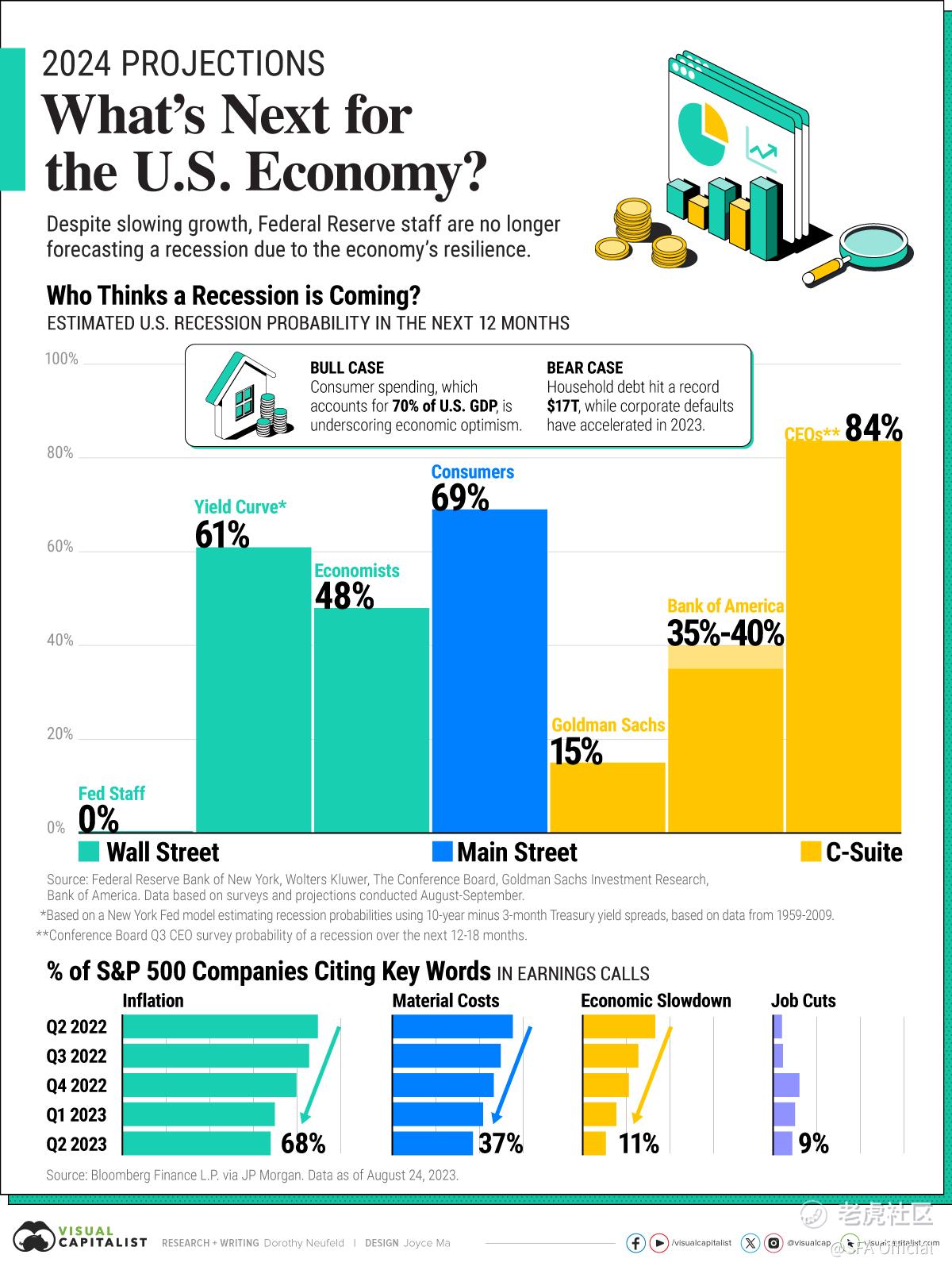Here are this week's investing and economic insights:
#MarketTrends
Is a Recession Looming in 2024? Experts Weigh In!
Amid recession fears, U.S. economic forecasts for 2024 diverge.
The Federal Reserve is optimistic, with a 0% recession probability, but the yield curve suggests a 61% chance.
Economists are divided at 48%, while consumers are cautious at 69%. Goldman Sachs is optimistic at 15%, but CEOs prepare for a recession (84%).
The Insight: How To Find The Opportunities
Investors can consider diversified portfolios, including bonds and defensive stocks, given the uncertainty.
Monitor interest rate impacts on consumer spending and corporate defaults. Seek investments in resilient sectors like major retailers.
Stay cautious but open to opportunities depending on economic developments.
#QuoteOfTheWeek
"A market downturn doesn’t bother us. It is an opportunity to increase our ownership of great companies with great management at good prices."
- Warren Buffett
Embrace market downturns as opportunities to acquire shares of excellent companies led by strong management at attractive prices, following Warren Buffett's strategy.
#What is happening in the economy?
No Changes in Policy for Months! What's Next?
The Reserve Bank of Australia (RBA) has maintained its policy stance without any changes for four consecutive months.
While there were anticipations of shifts in the language used, particularly because of the new governor, the official statement closely resembled the one from the previous month.
It emphasized the increasing fuel costs and the temporary surge in inflation.
In the coming months, it is anticipated that the RBA will likely continue to keep interest rates unchanged, considering the ongoing economic fragility, with the possibility of rate reductions in 2024.
Housing Market: Will Prices Keep Climbing or Take a Dive?
In the Australian housing market, home prices kept climbing in September, even though housing finance approvals indicated low transaction activity.
Challenges such as soaring costs and capacity constraints in housing construction could potentially exert downward pressure on both house prices and rental rates.
Market Shock: Are You Prepared for 'Higher for Longer' Rates?
Investors had been expecting central banks to cut interest rates due to inflation concerns, despite warnings from policymakers.
However, rising oil prices and strong economic data shifted this expectation. Investors are now accepting the "higher for longer" scenario, adjusting valuations with higher discount rates, contrary to their earlier hopes for rate cuts.
Nike's Epic Comeback: First-Quarter Results Break Silence!
Nike recently showed improved performance in its first-quarter financial results after a two-year decline.
However, its stock price remains 46% below its 2021 peak. Challenges include inflation-driven expenses, lower valuations due to declining interest rates, and reduced sales growth in China's slowing economy.
The valuation is complex, appearing low compared to the last decade but relatively high when considering the 2000-2012 period with different interest rates, hinting at future valuation sensitivity to interest rate changes.

Best Regards,
James Lim, SFA Founder
Top 3 discussed stocks : $Alibaba(BABA)$ $XPeng Inc.(XPEV)$ $Apple(AAPL)$

Comments
In a scenario when the conflict spreads, yes oil prices could jump. But will it necessarily cause inflation? We are more likely to see a recession, cause the economy is already weak. So I'd argue the opposite, higher oil prices may push us into a deflation and the Fed will pivot.
Honestly, a recession would help the big banks more than anything, as the yield curve would most likely un-invert due to the Fed lowering rates. However, this keeps looking unlikely. What we're seeing is equity being sucked out of the market in various assets, but the American job market remaining resilient. Essentially, this is a transfer from the rich to the working class, after over a decade of it being the opposite.
The only reason housing is holding on is it is one of the only assets that can be locked up with no sensitivity to interest rates because of the 30 year fixed mortgage. Commercial property doesn't have that advantage... The notes balloon at some point, which makes the sector more interest rate sensitive.
Yes, a very recession-y 5.2% real GDP growth for 2023.
Nike going the way of Disney.